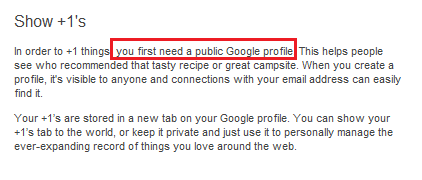It was impossible to miss. Google took center stage yesterday officially rolling out the +1 button for Web sites, giving Google users a googley way to recommend content across the Web (read Matt McGee’s SEL recap for awesome coverage). With a single click anyone can bookmark content for their individual use or opt to share that content with their Google network. Its Facebook’s Like button but with a different logo, a much bigger audience, and way bigger implications.
The button we’ve been hearing about since March? It is here.
Of course, that’s not at what was interesting about yesterday’s announcement. But stay with us.
Naturally, there was a lot of excitement over the rollout. From a marketer and publisher standpoint, it doesn’t take much to know if that if Google ushers in a new way for you to promote your content and a way to make it easier for readers to share it, that’s something you want to be a part of. But not everyone thinks this +1 thing is cool. I can think of at least two parties probably pretty PO’d over it. Or, at least if they were paying attention.
- Google’s left-for-dead product Google Buzz. Dude, those poor Buzz icons are now piling up on curbs faster than Shaq’s year-old Celtics jersey. The shame!
- Anyone who DIDN’T want to be forced into a Google Social Network. Because, oh hey, you just were.
And as I read the +1 coverage I couldn’t help but feel it was that last part that was completely glossed over during the feast of OMGNEWSHINYBUTTON! recaps. Everyone was talking about Google’s new content partners, what this means for publishers and how we could all get those hideous buttons cluttering up our site. No one was mentioning that by pushing users and publishers toward +1, Google had essentially corralled everyone into that social network they’ve long been vying for. Not only were the news outlets NOT mentioning it, they were denying its existence.
From PaidContent [emphasis mine]:
[+1] is all part of Google’s quest to replicate the information-sharing that takes place on social networks without having to build a unique social network of its own, hopefully encouraging people to consider Google a source of both algorithmically determined information as well as information curated by friends or colleagues.
But, hi. They are building it. They’re building it right here:

To use +1, you need to create a public Google profile. You don’t need a Gmail account or a Webmaster Central account like you need to use Google Reader, Google Calendar, Google Docs, Google Analytics or the rest of Google’s product line. You need to create a social Google profile, the one that connects you to everyone else you know, and starts getting a little too inquisitive about your relationship status.
That’s a social profile. Put a bunch of social profiles together and, oh hai, that’s a social network.
Here, let’s drive that home a little more:
Whether you’re a big brand, a small business owner, a blogger, a consultant, a marketer, a lawyer, a plumber, etc, if you want to promote your content via +1 aka Google, you need to create a public Google profile and become part of the network.
Whether you’re a heavy searcher, a moderate searcher, a student, a professional or my mother, if you want to bookmark content or share it with your friends the way you share content on Facebook, you need to create a public Google profile and become part of the network.
I guess Google employees really don’t want to have to worry about those socially-tied 2011 bonuses. Is Google evil for doing this? Is it bad? No, I don’t think it is. It’s actually a little genius, getting people into a network by offering them something they want and something that can help their business. However, it is worth noting. It’s worth paying attention to and being aware of. Because you’re gently being backed into a dark corner.
From an online reputation management and an SEO standpoint, I see the value of giving Google more social signals in which to rank my content. From a content publisher side, I know that I want to give users more options to spread word of mouth and circulate my content through their circles. But as a marketer, I can feel Google gently backing me into a dark alley.
I see the Google profiles being created. I see the blog posts being written on how to ‘optimize your Google Profile for maximum exposure’. We were already told during the Google Profile launch that the “most comprehensive” profiles will rank the best. I see us willingly giving Google a complete blueprint of our personal and professional social connections. I see Google Profiles and Google Friend Connect being used to create one user/password to unlock your entire personal Internet. I see a Google Internet secured by a Google Social Network, a place where you either exist or you don’t, where you’re either competing or you’re not.
We knew this was on its way. Eric Schmidt said as recently as a few days ago that his biggest failure as Google’s CEO was not making big enough strides in social. We’ve watched as Google has copycatted and mimicked the actions of Facebook and Twitter, doing its best to create something that makes sense.
And now it’s here.
So sure, we can talk about these new buttons and the new content sharing platform that was just released, but let’s not miss what’s staring us in the face. Yesterday, Google did more than release +1 for Web sites. Yesterday Google officially began pushing people into its social network. One that will only become more aggressive as Google gets more desperate and gathers more intel.
Welcome to the future, kids. The future where we’re officially being corralled into a Google-owned world. Not even Tom can save us now. I wonder who will play Larry Page in the movie?


